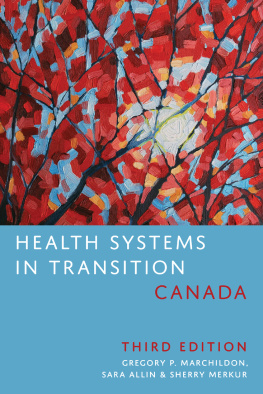Gregory Marchildon - Health Systems in Transition: Canada
Here you can read online Gregory Marchildon - Health Systems in Transition: Canada full text of the book (entire story) in english for free. Download pdf and epub, get meaning, cover and reviews about this ebook. year: 2021, publisher: University of Toronto Press, genre: Politics. Description of the work, (preface) as well as reviews are available. Best literature library LitArk.com created for fans of good reading and offers a wide selection of genres:
Romance novel
Science fiction
Adventure
Detective
Science
History
Home and family
Prose
Art
Politics
Computer
Non-fiction
Religion
Business
Children
Humor
Choose a favorite category and find really read worthwhile books. Enjoy immersion in the world of imagination, feel the emotions of the characters or learn something new for yourself, make an fascinating discovery.
- Book:Health Systems in Transition: Canada
- Author:
- Publisher:University of Toronto Press
- Genre:
- Year:2021
- Rating:3 / 5
- Favourites:Add to favourites
- Your mark:
- 60
- 1
- 2
- 3
- 4
- 5
Health Systems in Transition: Canada: summary, description and annotation
We offer to read an annotation, description, summary or preface (depends on what the author of the book "Health Systems in Transition: Canada" wrote himself). If you haven't found the necessary information about the book — write in the comments, we will try to find it.
This book provides insight into how the Canadian health care system is financed and organized, how it has evolved over time, and how well it performs relative to peer countries.
Health Systems in Transition: Canada — read online for free the complete book (whole text) full work
Below is the text of the book, divided by pages. System saving the place of the last page read, allows you to conveniently read the book "Health Systems in Transition: Canada" online for free, without having to search again every time where you left off. Put a bookmark, and you can go to the page where you finished reading at any time.
Font size:
Interval:
Bookmark:


Published by the WHO Regional Office for Europe acting as host organization for, and secretariat of, the European Observatory on Health Systems and Policies under the title Health Systems in Transition: Canada. 2020. Third Edition
World Health Organization 2020 on behalf of, the European Observatory on Health Systems and Policies
The Regional Office for Europe of the World Health Organization has granted reproduction and electronic publishing rights to University of Toronto Press.
Published in North America by University of Toronto Press, 2021
Toronto Buffalo London
utorontopress.com
Printed in the U.S.A.
ISBN 978-1-4875-0808-1 (paper)ISBN 978-1-4875-3752-4 (EPUB)ISBN 978-1-4875-3751-7 (PDF)
All rights reserved. The European Observatory on Health Systems and Policies welcomes requests for permission to reproduce or translate its publications, in part or in full.
Please address requests about the publication to:
Publications,
WHO Regional Office for Europe,
UN City,
Marmorvej 51,
DK-2100 Copenhagen , Denmark
Alternatively, complete an online request form for documentation, health information, or for permission to quote or translate, on the Regional Office website (http://www.euro.who.int/pubrequest)
The views expressed by authors or editors do not necessarily represent the decisions or the stated policies of the European Observatory on Health Systems and Policies or any of its partners.
The designations employed and the presentation of the material in this publication do not imply the expression of any opinion whatsoever on the part of the European Observatory on Health Systems and Policies or any of its partners concerning the legal status of any country, territory, city or area or of its authorities, or concerning the delimitation of its frontiers or boundaries. Where the designation country or area appears in the headings of tables, it covers countries, territories, cities, or areas. Dotted lines on maps represent approximate border lines for which there may not yet be full agreement.
The mention of specific companies or of certain manufacturers products does not imply that they are endorsed or recommended by the European Observatory on Health Systems and Policies in preference to others of a similar nature that are not mentioned. Errors and omissions excepted, the names of proprietary products are distinguished by initial capital letters.
The European Observatory on Health Systems and Policies does not warrant that the information contained in this publication is complete and correct and shall not be liable for any damages incurred as a result of its use.
University of Toronto Press acknowledges the financial assistance to its publishing program of the Canada Council for the Arts and the Ontario Arts Council, an agency of the Government of Ontario.

The Health Systems in Transition (HiT) series consists of country-based reviews that provide a detailed description of a health system and of reform and policy initiatives in progress or under development in a specific country. Each review is produced by country experts in collaboration with staff at the North American Observatory on Health Systems and Policies and the European Observatory on Health Systems and Policies. In order to facilitate comparisons between countries, reviews are based on a template prepared by the European Observatory, which is revised periodically. The template provides detailed guidelines and specific questions, definitions and examples needed to compile a report.
HiTs seek to provide relevant information to support policy-makers and analysts in the development of health systems in Europe and other countries. They are building blocks that can be used to:
learn in detail about different approaches to the organization, financing and delivery of health services, and the role of the main actors in health systems;
describe the institutional framework, process, content and implementation of health care reform programmes;
highlight challenges and areas that require more in-depth analysis;
provide a tool for the dissemination of information on health systems and the exchange of experiences of reform strategies between policy-makers and analysts in different countries; and
assist other researchers in more in-depth comparative health policy analysis.
Compiling the reviews poses a number of methodological problems. In many countries, there is relatively little information available on the health system and the impact of reforms. Due to the lack of a uniform data source, quantitative data on health services are based on a number of different sources, including data from national statistical offices, the Organisation for Economic Co-operation and Development (OECD), the International Monetary Fund (IMF), the World Banks World Development Indicators and any other relevant sources considered useful by the authors. Data collection methods and definitions sometimes vary, but typically are consistent within each separate review.
A standardized review has certain disadvantages because the financing and delivery of health care differ across countries. However, it also offers advantages because it raises similar issues and questions. HiTs can be used to inform policy-makers about experiences in other countries that may be relevant to their own national situations. They can also be used to inform comparative analysis of health systems. This series is an ongoing initiative and material is updated at regular intervals.
Comments and suggestions for the further development and improvement of the HiT series are most welcome and can be sent to .
HiTs and HiT summaries are available on the Observatorys website (http://www.healthobservatory.eu).
The Health Systems in Transition (HiT) profile on Canada was co-produced by the European Observatory on Health Systems and Policies and the North American Observatory on Health Systems and Policies (NAO) in Canada, which is a member of the Health Systems and Policy Monitor (HSPM) network. The NAO is a collaborative partnership of interested researchers, governments and health organizations promoting evidence-informed health system decision-making with academic directors in Canada, the United States of America and Mexico. The NAO partnership secretariat is hosted by the Institute of Health Policy, Management & Evaluation at the University of Toronto. The HSPM is an international network that works with the Observatory on Country Monitoring. It is made up of national counterparts that are highly regarded at national and international level and have particular strengths in the areas of health systems, health services, public health and health management research. They draw on their own extensive networks in the health field and their track record of successful collaboration with the Observatory to develop and update the HiT.
This 2020 edition was written by Gregory P Marchildon and Sara Allin (NAO, University of Toronto). It was edited by Sherry Merkur (European Observatory on Health Systems and Policies). The basis for this edition was the previous HiT on Canada, which was published in 2013, written by Gregory P Marchildon and edited by Anna Sagan. The European Observatory on Health Systems and Policies and NAO are grateful to Robert S Bell (former Deputy Minister of Health and Long-Term Care in Ontario), Colleen M Flood (Director, University of Ottawa Centre for Health Law, Policy and Ethics), Kathleen Morris (Vice President, Research and Analysis, Canadian Institute for Health Information) and her colleagues at the Canadian Institute for Health Information, and Anna Maresso (European Observatory on Health Systems and Policies) for reviewing the report. The authors are also grateful to Michael Sherar, University of Toronto, for research assistance, and to Stephen Lucas (Deputy Minister) and his colleagues at Health Canada as well as those at the Public Health Agency of Canada, the Canadian Institutes of Health Research, Employment and Social Development Canada, Global Affairs Canada and Indigenous Services Canada who reviewed specific sections of the HiT. Thanks are also extended to the OECD for their Health Statistics Database and to the World Bank for their World Development Indicators.
Font size:
Interval:
Bookmark:
Similar books «Health Systems in Transition: Canada»
Look at similar books to Health Systems in Transition: Canada. We have selected literature similar in name and meaning in the hope of providing readers with more options to find new, interesting, not yet read works.
Discussion, reviews of the book Health Systems in Transition: Canada and just readers' own opinions. Leave your comments, write what you think about the work, its meaning or the main characters. Specify what exactly you liked and what you didn't like, and why you think so.







